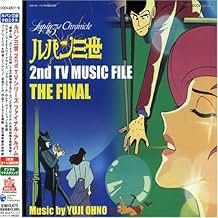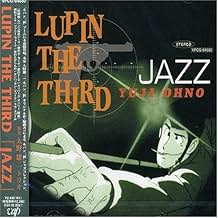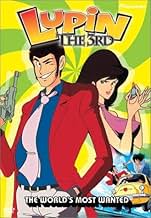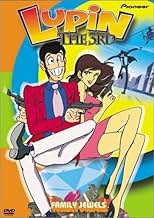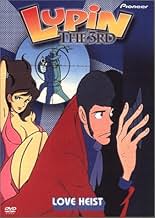PUNTUACIÓN EN IMDb
8,0/10
2,1 mil
TU PUNTUACIÓN
El maestro ladrón Lupin III y sus compinches continúan con sus hazañas trotamundos, con el obstinado inspector Zenigata siempre detrás de ellos.El maestro ladrón Lupin III y sus compinches continúan con sus hazañas trotamundos, con el obstinado inspector Zenigata siempre detrás de ellos.El maestro ladrón Lupin III y sus compinches continúan con sus hazañas trotamundos, con el obstinado inspector Zenigata siempre detrás de ellos.
Explorar episodios
Reseñas destacadas
With the main problem being the lackluster, progressive cartoonification of the traits of the characters from the first part, being that of Rupan Sansei progressively becoming less and less a gentleman's thief and more a stupid's thief who throws away a fortune for a billionaire groupie, Fujiko Mine (who, incredibly enough, is the only one showing proper thievery, crime skills, guts and intelligence amongst all the Rupan Sansei group) progressively and forcibly presented as ONLY interested in monetary gain and nothing else and when she doesn't show that is reprimanded because of 70's sexism, Jigen is slowly reduced to a caricature spouting misoginyst lines who the facto does not act as a misogyn because reasens and Goemon is out there doing stuff. And unfortunately, by season three, the writing which in season one and two was pretty good turned from acceptable to bad to godawful with a whole slew of badly written, nonsensical episodes where things happened with no resonance whatsoever, with the only saving point of again showing the intelligence of the real leader of the Rupan Sansei gang (you guessed it, her name being Fujiko Mine) and nothing else. I was onboard with the idea of throwing the characters in more out-of-this world, wacky situations a là Silver Age but not at the expense of bad writing and ridiculization of their main characteristics. My rating for this series is 8 for the first two seasons and 5 for the third one, which I dropped by episode 89, hence a generous 7. I won't bother with the fourth season.
I'm not a huge fan of anime, but for some reason, I love Lupin. Ever since it premiered on Adult Swim back in January, I've gotten a huge liking for it. Plus, it's so darn entertaining!!!
The cool thing about this show is how Lupin, and company in each episode always encounter a bad guy who may have something involved with what they're after. Of course to add more trouble is the restless Interpol inspector Zenigata whose been after Lupin for 7 years. In between these factors is off the wall antics, sexual themes, and lots, and LOTS of cleavage(courtesy of Fujiko).
Overall I like the show. It's pretty appealing, and it won me over from day one. If you've never seen this show, I suggest you check it out. You may like it.
P.S. Fujiko is HOT for a cartoon!
The cool thing about this show is how Lupin, and company in each episode always encounter a bad guy who may have something involved with what they're after. Of course to add more trouble is the restless Interpol inspector Zenigata whose been after Lupin for 7 years. In between these factors is off the wall antics, sexual themes, and lots, and LOTS of cleavage(courtesy of Fujiko).
Overall I like the show. It's pretty appealing, and it won me over from day one. If you've never seen this show, I suggest you check it out. You may like it.
P.S. Fujiko is HOT for a cartoon!
TL;DR: Though many of its episodes are more resembling of an old saturday morning cartoon, the quality in writing and funny (although quite campy) jokes make this series a superb comfort watch when you just want some well-done baseline Lupin III. Perfect for someone new to the Lupin III franchise to begin with.
Now to get into the long-form review:
This. This is what Lupin III should be in all its glory. This ancient anime set the standard for a dynasty that is still going to this day and is gaining more and more praise and fame across the world. Even though it is only the second series in the Lupin III franchise, it has managed to surpass the first by adopting a much lighter tone (although the later episodes of part 1 also laid the groundwork for this tonal shift), Yuji Ohno's superb work on the soundtrack and most crucially; the first English dub from what can now be called the greatest dub cast of the franchise.
It is for that reason why I recommend you watch the 2004 Geneon dub: even though its writing is heavily modified from the original Japanese dub and its animation is a bit shoddily adapted to this fact (especially in the first couple of episodes), the sheer hilarity campiness of the early 2000's dialogue can't be found anywhere else in the franchise.
I wouldn't really advise to watch this series from episode one 1 to 79 (yes, unfortunately only 79 of 155 episodes were dubbed), rather looking up a list of its episodes online (for instance here in IMDb) and just picking what you find interesting from reading the synopsis; due to a complete lack of continuity you can just tune in with any episode and get a unique story.
The episodes themselves can be categorized into three categories: 20% are true classics, 65% are fun for a comfort watch and 15% range from mediocre to downright awful. It is for this reason that I implore any new viewer to just explore the series on their own pace to test the waters and see what they like.
The series does have one pretty annoying aspect that can turn some viewers off of it; the animation. Even though it isn't bad for 1977, it still leaves a lot of room for improvement when you are used to the modern standard of animation in anime (and the latest installments of Lupin III). Some backgrounds loop too early, characters stand still for a bit too long, et cetera et cetera. Nothing out of the ordinary for cash-strapped TMS. Especially the English dub also suffers from poorly looped speech animations in its earlier episodes; if you have a strong distaste for poor animation, this series might not be for you.
However, the best part for the keen listener will be the soundtrack. This was the first series in which Yuji Ohno was involved with the soundtrack, and he hasn't been absent ever since for a very good reason. Comparing the sound design from part 1 to part 2 is comparing the sword to the rifle; there is simply no competition. In the series Ohno's masterful jazz fusion tracks are played near-constantly, and if you appreciate "70's groove" and a bit of spy movie aesthetic this series is practically Valhalla.
In conclusion; this is the true establishing ground for what Lupin III became. The English cast, the music and the style all originated from this series, and it still holds up as the baseline for any experience watching something from this storied franchise. Lupin III has his classic look, his classic gang and his classic adventures. If you want to get into the franchise without any previous engagement with Lupin III, here's where you start.
Now to get into the long-form review:
This. This is what Lupin III should be in all its glory. This ancient anime set the standard for a dynasty that is still going to this day and is gaining more and more praise and fame across the world. Even though it is only the second series in the Lupin III franchise, it has managed to surpass the first by adopting a much lighter tone (although the later episodes of part 1 also laid the groundwork for this tonal shift), Yuji Ohno's superb work on the soundtrack and most crucially; the first English dub from what can now be called the greatest dub cast of the franchise.
It is for that reason why I recommend you watch the 2004 Geneon dub: even though its writing is heavily modified from the original Japanese dub and its animation is a bit shoddily adapted to this fact (especially in the first couple of episodes), the sheer hilarity campiness of the early 2000's dialogue can't be found anywhere else in the franchise.
I wouldn't really advise to watch this series from episode one 1 to 79 (yes, unfortunately only 79 of 155 episodes were dubbed), rather looking up a list of its episodes online (for instance here in IMDb) and just picking what you find interesting from reading the synopsis; due to a complete lack of continuity you can just tune in with any episode and get a unique story.
The episodes themselves can be categorized into three categories: 20% are true classics, 65% are fun for a comfort watch and 15% range from mediocre to downright awful. It is for this reason that I implore any new viewer to just explore the series on their own pace to test the waters and see what they like.
The series does have one pretty annoying aspect that can turn some viewers off of it; the animation. Even though it isn't bad for 1977, it still leaves a lot of room for improvement when you are used to the modern standard of animation in anime (and the latest installments of Lupin III). Some backgrounds loop too early, characters stand still for a bit too long, et cetera et cetera. Nothing out of the ordinary for cash-strapped TMS. Especially the English dub also suffers from poorly looped speech animations in its earlier episodes; if you have a strong distaste for poor animation, this series might not be for you.
However, the best part for the keen listener will be the soundtrack. This was the first series in which Yuji Ohno was involved with the soundtrack, and he hasn't been absent ever since for a very good reason. Comparing the sound design from part 1 to part 2 is comparing the sword to the rifle; there is simply no competition. In the series Ohno's masterful jazz fusion tracks are played near-constantly, and if you appreciate "70's groove" and a bit of spy movie aesthetic this series is practically Valhalla.
In conclusion; this is the true establishing ground for what Lupin III became. The English cast, the music and the style all originated from this series, and it still holds up as the baseline for any experience watching something from this storied franchise. Lupin III has his classic look, his classic gang and his classic adventures. If you want to get into the franchise without any previous engagement with Lupin III, here's where you start.
Most people in the US get acquainted with the Lupin III series via Hayao Miyazaki's debut film, The Castle of Cagliostro (1979) or this 1977 TV series which briefly aired on Adult Swim a few years ago. While it never made a hit on Adult Swim, this series was a smash in the late 1970s, the result of the franchise's renewed popularity which came from reruns of the 1971 Lupin anime.
Personally, I prefer the 1971 Lupin anime to this later incarnation. Despite the super limited animation and uneven tone over the 23 episodes, it broke more ground, feels more adult, and is less repetitive. However, that does not mean the second Lupin TV series is not worth your time. It's a fun, goofy romp of a show, one that can prove addictive if you're craving insane humor and quasi-surreal action. Yuji Ohno's soundtrack is superb, the essence of 1970s cool.
Also, the Geneon English dub isn't half bad. All the voice actors do their characters justice and seem to be having fun. This is a good series, one that deserves more than the lukewarm reception it received in the States.
Personally, I prefer the 1971 Lupin anime to this later incarnation. Despite the super limited animation and uneven tone over the 23 episodes, it broke more ground, feels more adult, and is less repetitive. However, that does not mean the second Lupin TV series is not worth your time. It's a fun, goofy romp of a show, one that can prove addictive if you're craving insane humor and quasi-surreal action. Yuji Ohno's soundtrack is superb, the essence of 1970s cool.
Also, the Geneon English dub isn't half bad. All the voice actors do their characters justice and seem to be having fun. This is a good series, one that deserves more than the lukewarm reception it received in the States.
I love this series. It's a very fun series. Lupin the 3rd is the worlds greatest thief. He and his friends go around the world stealing priceless jewelry, artifacts aand etc.
This series is also a hilarious series, the things the team gets into is great. We also have a cop named Zenigata obsessed with catching Lupin the 3rd.
The chemistry between Lupin and Zenigata is great. The chemistry between all the characters is just amazing.
Over just a fun, hilarious series that is worth a watch. It is such an underrated series that deserves more love.
This series is also a hilarious series, the things the team gets into is great. We also have a cop named Zenigata obsessed with catching Lupin the 3rd.
The chemistry between Lupin and Zenigata is great. The chemistry between all the characters is just amazing.
Over just a fun, hilarious series that is worth a watch. It is such an underrated series that deserves more love.
¿Sabías que...?
- CuriosidadesThe series, more parody-based than its predecessor, has referenced/satirized a number of international celebrities, such as Alan Delon, Pele, Jacqueline Kennedy, and Aristotle Onassis (to avoid legal repercussions, the names have intentionally been changed by home video distributor Geneon to Japanese romanized spellings), as well as frequently parodying 1970s American movies and TV shows.
- Créditos adicionalesThe first season's opening credits has Zenigata chasing Lupin's gang across a desert, accompanied by five vignettes that focus on each character:
- Lupin breaks into Fujiko's bedroom
- Jigen shoots down an airplane
- Fujiko machine-guns down a shooter behind a door
- Goemon slices a plane in half
- and Zenigata continues to chase Lupin.
- Versiones alternativasA few changes were made for the US television and DVD releases. First, the episode "Hitler's Legacy" was removed from its space as episode three, to be reintroduced at a later date. (This was done to forestall potential protests about the episode, which used the Nazis as low comedy, including title character Lupin dressing up as Hitler.) Further, TMS gave Pioneer edited masters that had unspecified cuts and edits made to excise real-world corporate and product logos and copyrighted music snippets to prevent lawsuits. Pioneer has said that "Hitler's Legacy" will appear on a later DVD in the series' release: No word on whether the episode will appear on television.
- ConexionesEdited into Rupan sansei: The shooting (2001)
Selecciones populares
Inicia sesión para calificar y añadir a tu lista para recibir recomendaciones personalizadas
Detalles
Contribuir a esta página
Sugerir un cambio o añadir el contenido que falta

Principal laguna de datos
By what name was Rupan sansei: Part II (1977) officially released in India in English?
Responde
